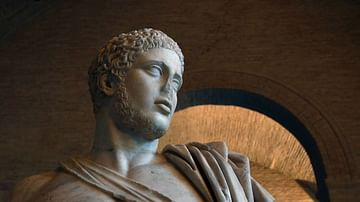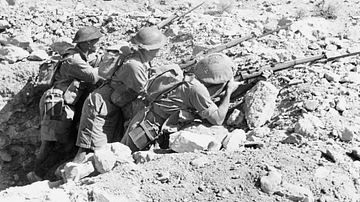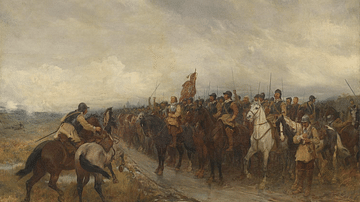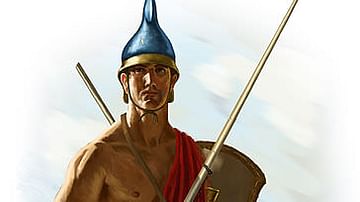Search
Did you mean: Assur?
Search Results

Definition
Ancient Celtic Religion
The polytheistic religion of the ancient Celts in Iron Age Europe remains obscure for lack of written records, but archaeology and accounts by classical authors help us to piece together a number of the key gods, sacred sites, and cult practices...

Definition
Diomedes
Diomedes is the king of Argos and a hero in Greek mythology. He was one of the leading warriors in the Trojan War, with the reputation of being gifted and strong in combat. He contributed 80 ships to the Greek forces in the Trojan War and...

Definition
Bayeux Tapestry
The Bayeux Tapestry shows in pictures the events leading up to the Norman conquest of England by William the Conqueror, Duke of Normandy, and his 1066 defeat of King Harold Godwinson at the Battle of Hastings. It was produced between 1067...

Definition
Siege of Tobruk
The siege of the port of Tobruk in Libya (April to Dec 1941) by Axis forces during the Second World War (1939-45) lasted 242 days and became a symbol of Allied resistance. Besieged by land but still supplied by sea, Tobruk was of vital strategic...

Definition
New Model Army
The New Model Army was created in February 1645 by the Parliamentarians during the English Civil Wars (1642-1651) that turned England from a monarchy to a republic. It was a professional army in terms of its personnel, training, and leadership...

Definition
Sarpedon
Sarpedon is a figure from ancient Greek mythology, a Lycian prince who was one of the principal heroes during the Trojan War and fought on the side of Troy. According to Homer's Iliad, he was the son of Zeus by Laodameia and the cousin of...

Definition
Peltast
A peltast was a type of Greek infantryman who was usually armed with a javelin and who carried a light shield. Originating from Thrace, the peltast was a common sight in Greek warfare during the Classical period and especially following the...

Video
The South Italic Cuirass
Dr Mike Burns speaks about The South Italic cuirass from the 6th to 3rd centuries BC at the Greek and Roman Armour Day, 20th July, 2015.

Book Review
Decorated Roman Armour: From the Age of the Kings to the Death of Justinian the Great
In Decorated Roman Armour: From the Age of the Kings to the Death of Justinian the Great, Raffaele D'Amato and Andrey Evgenevich Negin provide a chronological and typological analysis of Roman army equipment, especially focusing on “the evolution...

Article
Medieval Knights: 12 of the Best
The knights of medieval Europe were meant to be the finest fighting men of their age, even more important, they were expected to be pure in thought and deed, as exemplified in the chivalrous code which they (usually) followed. Here are the...